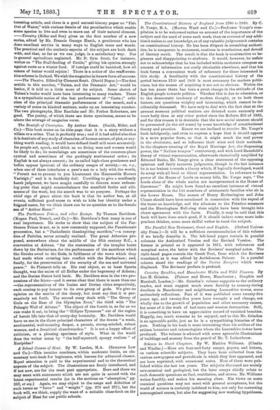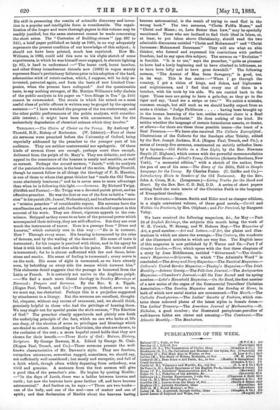Science in Short Chapters. By W. Mattieut Williams. (Chatto and
Windus.)—Here are four-and-forty essays, papers, and letters, on various scientific subjects. They have been collected from the various newspapers and periodicals in which they first appeared, and are here reprinted, with occasional notes. Most of them were pub- lished within the last ten years. The subjects discussed are mainly astronomical and geological, but the later essays chiefly relate to such domestic questions as fuel, ventilation, and stoves. Mr. Williams writes forcibly, and makes his meaning clear. His views on some comical questions may not meet with general acceptance, but the world of science is certainly indebted to him, not only for correcting unrecognised errors, but also for suggesting new working hypotheses.
His skill in presenting the results of scientific discovery and inven- tion in a popular and intelligible form is considerable. The repub- lication of the longer and more thorough papers in this volume may be readily justified, but the same statement cannot be made concerning the short notes. The "Corrosion of Building.stones " (pp. 337 to 341), a brief paper published so lately as 1881, in no way adequately represents the present condition of our knowledge of this subject ; it should not have been printed, much less reprinted. How Mr. Williams, in 1882, could add this note to his slight sketch of some experiments, in which he was himself once engaged, in electric lighting (p. 85), is hard to understand :—" The burnt card, burnt bamboo, and other flimsy incandescent threads now (1882) in vogue merely represent Sterr's preliminary failures prior to his adoption of the hard, adamantine stick of retort-carbon, which, I suppose, will be duly re- invented, patented again, and form the basis of new Limited Com- panies, when the present have collapsed." And the questionable taste, to say nothing stronger, of Mr. Mattien Williams's lofty disdain of the public analysts in his paper on "Iron-filings in Tea" (p. 244) cannot be commended. The strain in which his attack on a most useful class of public officers is written may be gauged by the opening sentence :—" I have watched the progress of the tea controversy, and the other public performances of the public analysts, with consider- able interest ; it might have been with amusement, but for the melancholy degradation of chemical science which they involve."



































 Previous page
Previous page